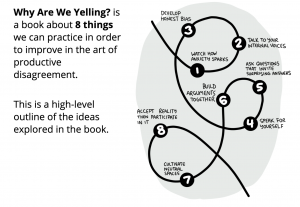Today we are joined by Buster Benson, entrepreneur and a former product leader at Amazon, Twitter, Slack, and Patreon. He previously co-founded The Robot Co-op and McLeod Residence.
Buster wrote the book titled “Why Are We Yelling? The Art of Productive Disagreement”. His interests include creative businesses, collaborative disagreements, cognitive biases, enterprise software, messaging platforms, behaviour change, social games, silly drawings, making life a little bit better through technology.
Why Should We Get Better at Disagreement?
It’s natural to look at disagreements in a negative way, and if we aren’t skilled in having crucial conversations about disagreement, we tend to feel stress and anxiety, shifting us into a fight or flight mode. Buster suggests that disagreements between individuals are goldmines of opportunity that can reap many benefits:
- As the skills of reading and listening, disagreement skill is a meta-skill – a skill that lets us learn other things.
- Constructively working through disagreements can rescue, repair and build relationships with others.
- Understanding the source of disagreements gives us visibility to our own and others values and the way we and they look at the world, or cognitive biases.
- Working through disagreements can unlock innovation.
Any of us following current affairs on the public stages right now can see firsthand how unskilled even our leaders are in constructive disagreement. Buster sees this as a significant problem for today’s society, and we will struggle as a species if we don’t improve in this area.
An Eight-Part Framework
The show continued by introducing an Eight-Part Framework for managing disagreement as illustrated here. The first step, Watch How Anxiety Sparks links directly to  our cognitive biases. All of us have values and perspectives on how we see the world, and when people or information challenges those, we can experience anxiety, shutting down our ability to be open and, as Sarah Noll Wilson showed us in season one, shuts down some of our higher brain functions, creating a disability for continuing the conversation.
our cognitive biases. All of us have values and perspectives on how we see the world, and when people or information challenges those, we can experience anxiety, shutting down our ability to be open and, as Sarah Noll Wilson showed us in season one, shuts down some of our higher brain functions, creating a disability for continuing the conversation.
That’s not to say that all biases are bad. Without biases, we couldn’t function in the world as we’d be questioning and evaluating every new signal and piece of information coming at us. Instead, if we Develop Honest Bias we accept and understand the source of the biases we have, and simply work to avoid being ruled by them and willing to take in new information that may change our bias, values and perspectives over time.
Speak For Yourself is one of the easiest elements of the framework to implement right away. It’s common in disagreements to talk about the ‘other’ side when we are often much better served by using “I” language and letting others do the some.
The Inner Voices
The Talk to Your Inner Voices element of the framework was particularly interesting. Buster noted that we make certain decisions and follow certain courses of action because of one of these voices:
- Power – we submit to the power or authority of the voice telling us to do something, be that positional or military or relational power.
- Reason – we are influenced by facts, laws, religion or another standard of what’s good or bad.
- Avoidance – the avoidance voice influences us to take the ‘no action’ action or decision and stay in status quo.
- Possibility – this influence, the most valuable of the voices, opens up disagreement in the most constructive and collaborative way.
When faced with disagreements, it can be helpful to know which of these voices is responsible for our current position. And if we are willing to be open up and be vulnerable with that recognition, we can enhance the conversation.

As leaders, we also need to understand that we can’t wait for perfect information. Problems and disagreements that we haven’t faced before, wicked problems, are often those that don’t get addressed because there is no clear path forward and many different opinions. Buster reflected on his time at Amazon and how the culture there was one of taking action and making decisions with velocity (quickly), and acceptance that sometimes mistakes would be made. Taking action and making decisions this way is the opposite end of the spectrum from the so-called, ‘analysis paralysis’ position.
Buster shared many other insights and stories about his work. If you want to go deeper, he’s now CEO of 750words.com and writes for Medium and busterbenson.com. View Buster's cognitive bias cheat sheet on Medium, and the slides from today's episode.
Take Your Business to the Next Level
At Results we care about your success, we understand how overwhelming it can feel to run a business, and we’re here to help. Reach out to Nicole through our contact form for ways to unleash the potential of your business.
Visit the Unleashed Podcast Library where you’ll find exclusive conversations with world-class thought leaders, authors, and leadership experts.
Each episode of Unleashed is hosted by Results’ CEO Jeff Tetz who spends most of his day exploring what makes high performers tick and helping build a community of leaders who want to learn and grow together. Follow Jeff (Twitter; LinkedIn; Instagram) for more great leadership insights.



